#Regime Fiscal
Explore tagged Tumblr posts
Text

View On WordPress
0 notes
Text
Partita IVA: Come aprire e gestire con successo
Se sei un libero professionista o gestisci una ditta individuale, l’apertura e la gestione della Partita IVA sono fondamentali. Questo documento è essenziale per operare nel mondo degli affari. Ti mostreremo come registrare la tua Partita IVA, capire gli obblighi fiscali e gestire al meglio la tua attività. Punti chiave Scopri cosa significa avere una Partita IVA e quali sono i requisiti per…
0 notes
Text
Discurso na íntegra do Milei no CPAC
Buenas tardes a todos. Quero agradecer às autoridades do CPAC pela convite e ao presidente Jair Bolsonaro e Eduardo Bolsonaro pela calorosa recepção. Realmente me fazem sentir em casa, e é sempre um prazer estar entre amigos. Hoje quero falar sobre a receita econômica e cultural do socialismo na América Latina, mostrar como eles estão errados e nós temos razão, e sobre como estamos lutando pela…
#Argentina#batalha cultural#capitalismo#corrupção#CPAC Brasil 2024#deficit fiscal#desastre econômico#desregulamentação#economia liberal#emissão monetária#Foro de São Paulo#gasto público#Grupo Puebla#história da liberdade#ideologia do fracasso#inflação#investimentos privados#justiça social#liberdade de expressão#liberdade econômica#livre mercado#mudança de regime#políticas socialistas#populismo#Presidente Javier Milei#progresso humano#reforma econômica#socialismo na América Latina
0 notes
Text

#Matrícula de Armazéns Gerais;#Registro de Armazéns Gerais;#Legislação de Armazéns Gerais;#ICMS de Armazéns Gerais;#JUSCEP de Armazéns Gerais;#Constituição de Armazéns Gerais;#Legalização de Armazéns Gerais;#Tributação de Armazéns Gerais;#Contrato de Armazéns Gerais;#Inscrição de Armazéns Gerais;#Certificado de Armazéns Gerais;#Nota fiscal de Armazéns Gerais;#Regime Interno de Armazéns Gerais;#Memorial Descritivo de Armazéns Gerais;#Tarifa de Armazéns Gerais;#Laudo Técnico de Armazéns Gerais;#Termo de Nomeação fiel Depositário de Armazéns Gerais;#Leis de Armazéns Gerais;#Remessas de Armazéns Gerais;#Transportadora de Armazéns Gerais;#Locação de Armazéns Gerais;#Alteração contratual de Armazéns Gerais;#Alteração contratual de transportadora para Armazéns Gerais.
0 notes
Text
EFD/ICMS-IPI: Nota Orientativa 01/2023 – ICMS Monofásico – Combustíveis
Através da Nota Orientativa 01/2023 foram divulgadas instruções para escrituração de operações com ICMS monofásico, a partir dos novos CSTs criados pelo Ajuste Sinief 01/2023. Com a publicação da NT 2.023.001 da NFe/NFCe, adotando os CSTs 02, 15, 53 e 61, a escrituração das operações seguirá as instruções que se acrescentam às demais publicadas no Guia Prático da EFD ICMS IPI. Fonte: site SPED…

View On WordPress
#combustíveis#escrituração fiscal#escrituração fiscal digital#icms#nota orientativa#orientação#regime monofásico
0 notes
Text
I just want to get it out there that Elon Musk keeps saying – in words – that the Trump plan is to crash the economy. He keeps saying it, because he thinks it’s a good thing. Ordinary Americans will have to “embrace the pain.” People like him won’t have to do that, of course not!
But, you know.
You.
The little people.
Then and only then, after a big crash, will the economy be allowed to recover under what one supposes would be a new hyper-austerity regime.
From all historical experience, this “austerity” regime would really be a looter regime. It’d also be deflationary, which is great if you’re a billionaire and terrible if you’re everyone else, since most people will make less and less over time, while the billionaires will keep more and more since the rich won’t be paying any taxes, and the value of their stored wealth – their idle, uninvested, non-productive money caches – will increase all on its own.
The MAGA government would be gambling on the idea that American memory is so short that they’ll forget before the collapse.
Well, that, and…

And I give this credence because, well, one, yeah, Trump’s plans will crash the economy. But I also give it credence because of something Trump said before even running for office. He said this:
When the economy crashes, when the country goes to total hell and everything is a disaster, then you’ll have riots to go back to where we used to be when we were great. – Donald J. Trump on Fox and Friends, 2014
Because Elon’s saying that’s the plan this time. It wasn’t the plan last time maybe, but it’s the plan this time. And “go back to where we used to be” was white supremacy with women as men’s property. That’s what he wants.
Trump’s Director of Whitehouse Personnel just today called to end voting rights for women, saying that women shouldn’t vote and that the 19th Amendment “might have to go.”
I mean really, at this point in the campaign, what people generally need to be focusing on is getting out the vote. But sometimes things happen that are big enough to talk about, like the explosion of race hate coming out of the Trump rally at Madison Square Garden on Sunday. And that raw hatred – and their doubling down on it on Monday and Tuesday – is the most important item this week, absolutely.
But for the “fuck you I got mine” crowd amongst your friends, particularly the ones who are perfectly happy to laugh at racial hate jokes and really kinda like it since hey, it’s not their problem, well…
I would think that intentionally crashing the economy might give them something to care about.
Just maybe.
Because Elon keeps saying it, out loud. Elon, who would be in a Trump administration, who would be the one doing the broad strokes of fiscal planning, keeps saying that they will crash the economy, and that they will do it on purpose.
That might be something to tell your more racist family and friends.
Maybe – just maybe – they’ll care about that.
5 days remain.
#us politics#american politics#fascism#election 2024#2024 election#2024 elections#elon musk#billionaires#oligarchy
240 notes
·
View notes
Text
Kenya can have democracy or neocolonial extraction, but not both – because democracy means addressing the demands of the Kenyan people for jobs, healthcare, education, housing, transportation and basic social protections under a fair and equitable fiscal regime, while colonial extraction means the destruction of economic and monetary sovereignty, austerity for the poor, extravagant lifestyles for the elites, corruption, injustice and socioeconomic exclusion under a fiscal regime that accelerates the engines of economic entrapment. One cannot democratize a system that hasn’t been structurally and economically decolonized yet. Despite Kenya’s democratic institutions, transparent elections, independent judiciary, freedom of speech and vibrant civil society spaces, its elected governments systematically undermine the social and economic demands of Kenya’s population – less because those governments wish to ignore the mandate given to them by the electorate, but because they face financial pressures from abroad that force them to prioritize external debt service and the financial needs of creditors and foreign investors. In 2019, Kenya used 19% of its export revenues to service external debt; today that number has jumped up to nearly 50%. When a country uses half of its export revenues to pay interest on its external debt instead of investing in the basic pillars of development and prosperity, it is not surprising to see the kind of revolt that we have seen in Nairobi against the 2024 finance bill. This makes Kenya a classic case of an economy steered from abroad, by colonial design rather than by accident. The fact that Kenya is in a debt trap after decades of following IMF policy prescriptions means that either the IMF is incompetent or it is engaging in intentional economic entrapment. I believe it’s the latter. It is time to end the entrapment and to decolonize the Kenyan economy.
10 July 2024
137 notes
·
View notes
Text
also the idea that the inquisitor was Average Joe before the conclave explosion and thats why they're a centrist feeds into the bullshit approach dai has to politics too, abt how politicking is for rich people who have the time to worry abt such things/rich people who are supposed to Guide Nations and the ordinary poor people are busy worrying about real world problems to care abt who's ass is on the throne. which is so disconnected from reality, bc in reality rich people are incredibly insulated to government regime changes, and its the every day ordinary people who are heavily impacted by the government's fiscal policy, foreign policy, etc etc. like we're aware working class people had to fight for the vote irl because of these kinds of arguments, right? we know this line of argument is classism, right?
62 notes
·
View notes
Text
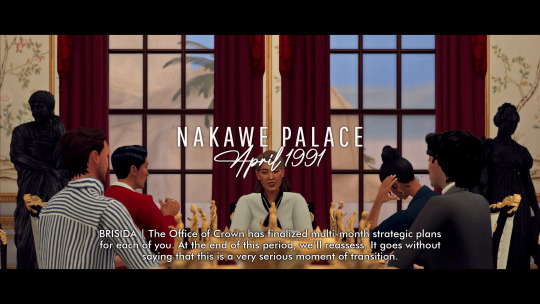


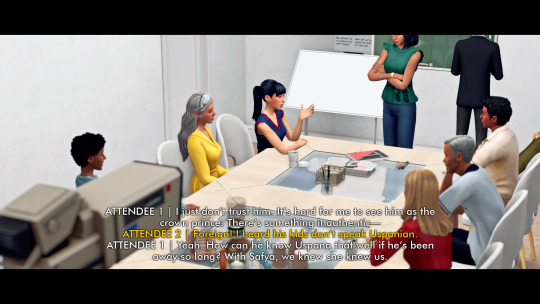

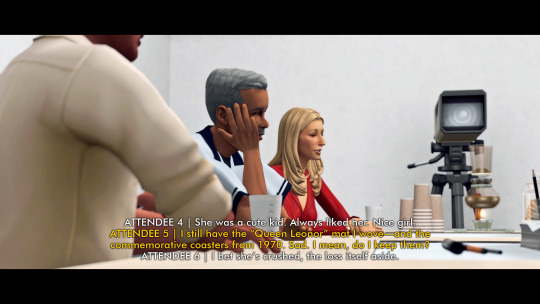

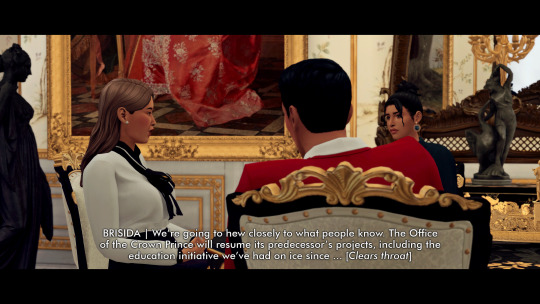






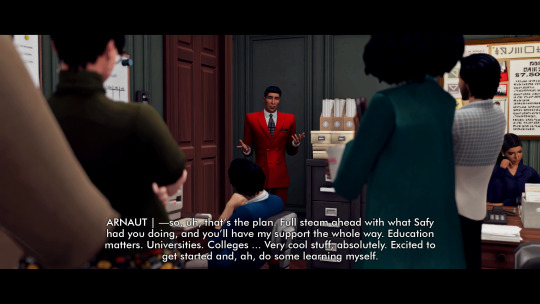

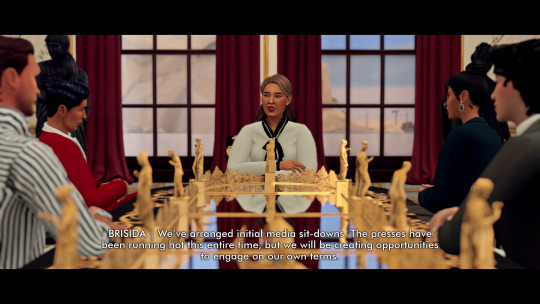
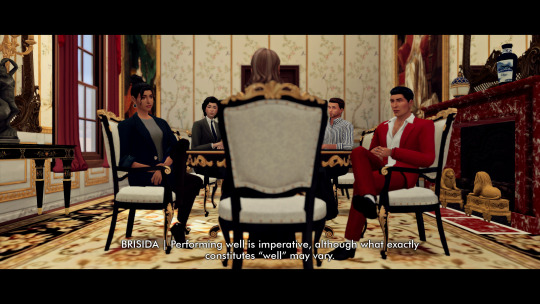










𝐍𝐎. 𝟏 ❛ 𝐡𝐨𝐭 𝐚𝐧𝐝 𝐟𝐚𝐬𝐭 ❜ | NAKAWE PALACE, APRIL 1991
❧ 𝐝𝐢𝐫𝐞𝐜𝐭𝐨𝐫𝐲 / 𝐛𝐞𝐠𝐢𝐧𝐧𝐢𝐧𝐠 / 𝐩𝐫𝐞𝐯𝐢𝐨𝐮𝐬 / 𝐧𝐞𝐱𝐭.
❛ Leonor had always worked. She could not remember a time when she hadn’t; in even her earliest memories, she was a focused observer on the periphery of business underway. Like designated heirs before her, she lived according to a strict regime premised on the idea that education must be experiential. Instead of attending school, Leonor’s day saw her shuffled between academic tutors and the myriad meetings that occupied her mother and grandmother. It eventually became insufficient to only sit on the sidelines, however silent and attuned. Instead, Beatriz would—without a glance, as her eyes remained fixed upon some poor minister or combative legislator—throw out a question Leonor came to know well. Her grandmother would ask, nonchalant, “ What about it, Leonor? "
❧ progress :^)
𝐬𝐜𝐞𝐧𝐞 𝐜𝐨𝐧𝐭𝐢𝐧𝐮𝐞𝐝 & 𝐭𝐫𝐚𝐧𝐬𝐜𝐫𝐢𝐩𝐭 ↓
Uspana’s public employees knew they held bit parts in the education of their future sovereigns. They played along when necessary but, for the most part, could ignore the occasional intrusion. Now an adult, Leonor wondered what they truly thought during those moments when the queen pretended to consult with her grandchild on questions most adults would find confounding. It was routine for Leonor. It had been routine for those before her. Yet, she understood that they were all extraordinary—that their lives were tied up in unyielding bows of pageantry and ritual, even behind ostensibly closed doors, while millions of other children were allowed to be immature and irresponsible.
Even the children of politicians had childhoods. Despite lacking many firsthand comparisons, she had wistfully perceived the gulf between herself and Arturo on many occasions. The difference between the child of a politician and the child of a royal was simple: he could be anything he wanted to be, but she was born for one singular purpose. That purpose was too immense for childhood. One had to give, and it was for each successive generation a foregone conclusion as to which must go.
Leonor could recall with perfect clarity the first time her grandmother had posed the question. A dozen pairs of eyes fell upon her while she sat like a stone in a rigid antique chair against the boardroom’s far wall. Barely ten years old, she felt the room go sideways as her heart raced and her skin warmed. Her feet didn’t touch the floor in that chair; she had held them perfectly still as she stared at the shiny black leather of her shoes. In her mind, she scrambled for an answer to a question whose operative words she could not define.
Still, she understood something crucial. Beatriz didn’t want her opinion on the minutiae of the budget being discussed. What she wanted was to know Leonor had apprehended a different, much more crucial element of the meeting—if she understood, as any good ruler must, that all politics are inseparable from personality. Leonor finally repeated something she heard a minister say, choosing with care the person whose words she would echo. She knew that this man was an enemy of the queen. She also knew that Beatriz was currently pretending to like him because he was despised by another colleague, one whom Beatriz disliked even more. Leonor couldn’t wrap her child’s mind around the fiscal debate, nor did she know the full details of these relationships. She had nonetheless paid attention to them, and she understood the dynamics the way other children might the convoluted conflicts of a schoolyard playground.
It was in this way that she developed the skills her work required. Some of it came naturally. Leonor knew herself to be intelligent, perceptive, and diligent. As she grew older, questions of policy and public relations became easier to tackle. She could weigh in on debates with her own opinions, and she could form those opinions based in part on her command of the ever-shifting social networks that so often controlled the workings of government. Sometimes, Beatriz embarrassed her. She sat back, smug and prideful, other times. More than just pleasing her grandmother, being able to actively serve the Crown was fulfilling. It was satisfying work—work laid out, not just by custom, but by divinity itself. Leonor believed this was indeed what she had been born to do, and the pursuit of doing it well gave her life clear, constant purpose.
In early 1991, she no longer felt that way. Her purpose had been taken in the only legitimate way available; the death that triggered the process, meanwhile, had robbed her of the desire to find a new purpose. It was possible she would never be satisfied or fulfilled again, and she toyed with the idea of accepting that proposition. No one seemed to care what shape her life took next. She could rot in her apartment for years if she wanted.
Yet, soon enough, a realization crawled its way from deep inside her. She could not completely hold back the unpleasant feeling of stagnation that such a life threatened. Leonor was not ready to entomb herself. She was still intelligent, perceptive, and diligent. She had taken to her work for more reasons than just obligation and routine. Grief had obliterated much, but those fundamentals remained the same. Time’s ceaseless passage, stretching days into weeks and weeks into months, eroded enough of the mind-numbing pain to reveal this basic truth. Leonor needed to do something. Although there was nothing she desired to do, passion was not a prerequisite. The choice made itself: Leonor, in truth, was only really capable of doing one thing.
TRANSCRIPT:
BRISIDA | The Office of Crown has finalized multi-month strategic plans for each of you. At the end of this period, we’ll reassess. It goes without saying that this is a very serious moment of transition.
BRISIDA | We have to change your positions in the world—overnight, basically. It’ll take longer to sell everyone on that, but we’re committed to persuasion. We have no other choice.
BRISIDA | Recent focus groups have been conclusive, so we’ve based our plans and recommendations on those conclusions.
ATTENDEE 1 | I just don’t trust him. It’s hard for me to see him as the crown prince. There’s something inauthentic— ATTENDEE 2 | Foreign! I heard his kids don’t speak Uspanian. ATTENDEE 1 | Yeah. How can he know Uspana that well if he’s been away so long? With Safya, we knew she knew us.
ATTENDEE 2 | I have a clear memory of Arnaut. What I remember is trouble. There was the gambling—oh, just astonishing amounts of money. Nonsense. They kicked him out of the military because he couldn’t cut it. More nonsense. He was a very unserious boy. ATTENDEE 3 | My question is has he outgrown that?
ATTENDEE 4 | She was a cute kid. Always liked her. Nice girl. ATTENDEE 5 | I still have the “Queen Leonor” mat I wove—and the commemorative coasters from 1970. Sad. I mean, do I keep them? ATTENDEE 6 | I bet she’s crushed, the loss itself aside.
ATTENDEE 6 | My husband was laid off—a job he worked for twenty years. He said when it happened that it was his identity and part of him was dead. Killed, you know? It must feel that way. Hard to recover. [Murmurs of agreement]
BRISIDA | We’re going to hew closely to what people know. The Office of the Crown Prince will resume its predecessor’s projects, including the education initiative we’ve had on ice since … [Clears throat]
BRISIDA | Think of it as training wheels, for now.
ARNAUT | I have to read all of this?
AIDE 2 | The princess would, my prince. ARNAUT | By tomorrow?
[Arnaut sighs]
BRISIDA | My queen devised a solution for you, my princess, which is that you will also resume your existing work. We’ve slotted you back into the initiative alongside your uncle, per her instructions.
BRISIDA | We wouldn’t want to let your familiarity go to waste.
ARNAUT | —so, uh, that’s the plan. Full steam ahead with what Safy had you doing, and you’ll have my support the whole way. Education matters. Universities. Colleges … Very cool stuff, absolutely. Excited to get started and, ah, do some learning myself.
[Leonor groans]
BRISIDA | We’ve arranged initial media sit-downs. The presses have been running hot this entire time, but we will be creating opportunities to engage on our own terms.
BRISIDA | Performing well is imperative, although what exactly constitutes ��well” may vary.
BERNARDO | You’re in the education business now. There’s been talk in the assembly of revisiting the USI Act of 1981. Are you in favor?
ARNAUT | Well, that would depend. BERNARDO | On … ?
ARNAUT | If you can tell me what the “USI Act of 1981” is.
MAYA | There’s been unprecedented interest in you as of late. Have you been paying attention to the coverage? LEONOR | It’s not my focus.
MAYA | But, you’ve seen some of it? LEONOR | I really don’t have time to stay current with those things.
MAYA | It seems like you have plenty of free time! Certainly, it’s been reported that your evenings are stacked with entertainment. You weren’t known as a nightlife person until recently, much less the staggering-out-at-three-in-the-morning sort.
LEONOR | Sure, I go out from time to time. MAYA | Alright. Diplomatic.
MAYA | Let’s switch gears. Will you be speaking to Mencia Cipac? LEONOR | Nothing has come across my desk yet. MAYA | It’s rumored she’s starting a new project—topic: you. LEONOR | That’s Miss Cipac’s business. I wish her well. MAYA | Would you speak to her? LEONOR | I’m speaking to you.
LEONOR | Will Mother Beatriz be meeting with us soon? BRISIDA | She is scheduled to meet with Prince Arnaut next week.
BRISIDA | Her time is finite. We have to prioritize. LEONOR | Of course.
46 notes
·
View notes
Note
In your post on 10 August you correctly pointed out how often the violence under the Ancien Régime gets always overlooked and you mentioned the Beast of Gévaudan, the deliberate repressions by Louis XIV or Louis XVI, the repression of the Flour War. What happened during these events?
Warning: Regarding the case of the Beast of Gévaudan, there are some shocking elements related to the criminal investigation. So, please refrain from reading if you feel uncomfortable with this. Sensitive souls should refrain from reading this part of text. I want to mention that I am not very knowledgeable about the Ancien Régime, so feel free to correct or add to what I say (especially regarding the Flour War).

Dragonnades under the reign of Louis XIV to force Protestants to convert to Catholicism ( The engraving dates from 1686 and is by Engelmann, Les nouveaux missionnaires)
Ah, here we are again, discussing the Ancien Régime. There are many things to say (some of which are positive; we should also fight against the demonization, but I will limit myself to starting with the period under Louis XIV rather than Henri IV).
Louis XIV, what can be said? Well, ironically, if we want to better study the issues that led to the Revolution, it starts with him (in my eyes). I will quickly touch upon his reign and the reasons why he wanted an absolute regime (due to the trauma he experienced as a child during the trials he endured during the Fronde, under the regency of his mother and Cardinal Mazarin). One day, I came across a phrase on a forum that I found revealing about the reigns of Louis XIV, Louis XV, and Louis XVI. It said something like, "Louis XIV creates the debt, Louis XV manages it and passes it on to his successor (Louis XVI), who, due to his character and actions, causes the Revolution to break out." Although reality is more complex, I think this phrase aptly describes the origin of the massive debt of the Kingdom of France.
His wars financially drained the kingdom of France, showing that, in reality, wars of conquest can be more harmful than beneficial due to their expenses, especially if the territories do not bring in revenue (at least when Tsar Peter the Great waged war against the Turks, it was to gain access to the Sea of Azov for long-term commercial purposes). By the end of his reign, the state was financially ruined, all due to excessive conquests and wars that could have been avoided. Let's not even talk about horrific episodes like the Sack of the Palatinate in 1689 and how he alienated foreign powers. Here’s what Voltaire had to say on the subject: "This beautiful country was ravaged under Louis XIV for the second time; but the flames with which Turenne had burned two towns and twenty villages in the Palatinate were mere sparks compared to this final conflagration. Europe was horrified. The officers who carried it out were ashamed to be the instruments of such cruelties" (excerpt from The Age of Louis XIV).
This led to several revolts due to the increasing tax burden, the most notable of which was in Brittany. It is important to note something about Brittany and taxes. In 1491, Duchess Anne of Brittany married Charles VIII. France then annexed the Duchy of Brittany, but in return, Brittany retained a fiscal system specific to the former duchy, and no additional levies could be imposed without the agreement of this former duchy.
Louis XIV violated this fiscal exception and increased taxes as part of his war against Holland. This led to what would be called the Revolt of the Red Bonnets in Brittany, and across France (as there were other zones of insurrection like Grenoble, Bordeaux, Pau, Besançon), it would be known as the Stamp Paper Revolt in 1675, triggered by the ever-growing misery of the population. The revolt in Brittany was the most significant, with castles being attacked and uprisings against their lords. On July 2, the rebels demanded the abolition of seigneurial abuses, among other things, and proclaimed a Peasant Code, which included a series of texts, some of which apparently echoed aspects of the grievance lists of 1789.
The repression in Brittany was brutal. Six thousand men were sent to crush the rebellion. There were hangings, and some were sent to the galleys. The body of one of the leaders, Le Balp, was exhumed to be desecrated. Other leaders were tortured before being executed. The suburb of Saint-Malo was deemed too rebellious.
In October 1675, the city experienced violence, apparently at the hands of Louis XIV’s troops. Residents of certain streets were expelled to the point where the Marquise de Sévigné wrote, "Do you want to know the news from Rennes? An entire large street was driven out and banished, with the threat of death if they were taken in, so that one could see all these miserable people—old men, women who had just given birth, children—wandering in tears as they left the city." On February 5, 1796,
In his absolute control, Louis XIV sought to annihilate any rebellion. Under Louis XIV, there were 40,000 deserters, Protestants, counterfeiters, and salt smugglers condemned to the galleys, which was a horrific ordeal.
For criticizing absolutism, the theologian and tutor of the king’s grandson, Fénelon, fell out of favor. To better eliminate any opposition, a new position of Lieutenant General of Police was created in Paris, tasked with not only surveillance but also reforming justice to extend cases that could be judged directly by the King’s judges. During the inquisitorial process, the investigation was secret (which, as a law student, I admit can have both positive and negative aspects) and confessions were extracted, including through the use of torture (terrifying and horrible).
The Code Noir of 1685 authorized and even justified slavery with the goal of increasing the production of mineral and agricultural wealth.
The Edict of Nantes, which had allowed Protestants to live in peace, was revoked by Louis XIV. This led to the "dragonnades," a method in which "dragons," or royal soldiers, were forcibly quartered in the homes of Protestants considered heretics, using all possible means to force them to convert. I can hardly imagine the brutalities committed in the homes of these victims to obtain so many abjurations from the Protestants so that these soldiers would leave.
When Louis XIV died, he was deeply unpopular. Misery was widespread, and the peasant class could barely survive. In the event of climatic accidents, famine and mortality rates were extremely high, particularly in 1694 and 1709.
It is easy to see that the seeds of the Revolution were already being sown under Louis XIV. In 1694, there was the Red Bonnets uprising, and barely a century later, the Revolution and the overthrow of the monarchy, and the uprising of the slaves. We can clearly see where the first seeds of the Revolution began to germinate.

The fight of Marie-Jeanne Vallet, known as the “Maid of Gévaudan”, against the beast. Sculpture by Philippe Kaeppelin.
Now we come to the case of Louis XV, and one example that struck me the most about the dysfunction of the country is the affair of the Beast of Gévaudan (though there are many others, and more important ones). This remains one of the most mysterious criminal cases that has never been solved. However, this example highlights another dysfunction of the Ancien Régime beyond slavery, famine, religious intolerance, and repression. It is simply the issue of security in the face of the crime that the lower class suffers in certain areas.
France had just come out of the Seven Years’ War (an extremely deadly conflict), relatively defeated by England and financially ruined. The incident took place in the county of Gévaudan (which is in the province of Languedoc). The area included the Margeride, a difficult-to-access region with mountain ranges and marshes. In Gévaudan, life was harsh, predominantly populated by peasants; life was very tough, life expectancy was very short, children started working very early, and the peasant class primarily sought to survive.
But it’s the problem of crime that will be highlighted here (so I won’t go into too much detail about the affair of the Beast of Gévaudan). However, it’s necessary to explain this criminal case to better understand what follows. This case is complex, and the aim is not to explain it fully but rather to show the attitude of King Louis XV’s government, which tends to indicate what could be called willful criminal negligence. Therefore, the mystery of the Beast of Gévaudan is quickly summarized, and if you’re interested in understanding the case from an "investigative" perspective, you won’t find it here (it would take at least two to three pages), especially for suspects and theories explaining this mystery.
It all began in June 1764. A shepherdess living in Langogne was attacked by a beast. She owed her life to the cows that charged to protect their calves. The most striking thing is that the beast completely ignored the cows to focus solely on her. She survived, but it was the beginning of a long series of attacks. The beast was described as a wolf with a black stripe down its back (even today, it’s unclear whether it was a dog or a wolf). This was surprising because the inhabitants were always close to wolves, and no attacks had been recorded.
The beast went on to claim several victims, some of whom were horrifically devoured alive in front of helpless witnesses. Some survivors were scarred for life, and several children died.
Initially, King Louis XV took the matter very seriously: he sent one of his close associates, François Antoine, and enormous resources were employed. However, when the beast was not conspicuously absent, bullets seemed to bounce off it, or it got back up (one of the reasons for speculating that the beast had been trained by a human, as the black stripe could have come from a boar’s hide used as a protective cuirass against pistol bullets). Very questionable means (to put it mildly) will be used such as poisoning the corpses so that the Beast of Gévaudan eats it and poisons itself. But it doesn't work. Then, on September 20, 1765, François Antoine (or one of his aides) killed the beast. Witnesses and survivors of the attacks confirmed it was the Beast of Gévaudan (about twenty of them). However, it had killed on the other side of the river, where it had not been very active. Despite this, Louis XV declared that the affair was over and that the Beast of Gévaudan had been killed. And yet, after a period of calm due to the winter (when herds were less exposed), the attacks resumed with even greater intensity in the spring, with more and more victims. The attacks were concentrated mainly in the Margeride.
This is where we see the indifferent side of the Ancien Régime. For the monarchy, which had been ridiculed by the Beast of Gévaudan, the matter was closed. Officially, the Beast of Gévaudan had been killed, and with censorship in place, there was no mention of other attacks by the beast after 1765. On gravestones, it was now forbidden to say that a victim had been killed by the Beast of Gévaudan. There would be no more assistance, and the inhabitants were left to fend for themselves. One must be cautious, but we can speak of willful criminal negligence: to save face, the monarchy pretended to ignore the deadly attacks and even censored news about the affair. Fortunately, the Marquis d’Apcher continued to organize hunts to kill the beast at his own expense. But his resources were not those of a state and therefore very limited. The attacks officially ended in June 1767. A man named Jean Chastel ended the Beast’s life under strange circumstances (I don’t want to accuse deceased people with little evidence; it’s just that some facts make him seem suspicious, while others exonerate him, especially since in those superstitious times, he was looked down upon for reasons we’d find foolish today. For example, he apparently didn’t attend church much, although when Marie Danty, a 12-year-old girl with whom he was friendly, was devoured alive, he began attending church and had his bullets blessed. He could read and write, which was rare for someone of the lower class, and he was allegedly the son of a healer, whom some called a witch. On the other hand, when Marie Danty died, he swore he would be the one to kill the Beast of Gévaudan, and according to some witnesses, when the beast saw him, it simply sat down, whereas when it was present, it wouldn’t let itself be caught. Moreover, its black stripe had disappeared, although survivors had said it had one. However, I ask that we avoid making accusations against Jean Chastel out of respect for his descendants,while there is a high probability that he is innocent , we cannot make accusations without evidence).
Another frightening aspect of France in this affair is that not all the crimes were committed by the Beast of Gévaudan. It’s clear that at least several murderers committed acts that were blamed on the Beast, especially considering how some victims were killed. In fact, Margeride was notorious for its lack of security, its criminality, and the maréchaussée (mounted police) had only just been established, with many brigands or worse. The last crime attributed to the Beast of Gévaudan was actually committed by a human who killed a woman, Marianne Thomas, in 1777. The woman, in her agony, said it was the Beast. But in reality, it was a man disguised as the Beast, wearing fur, who had committed the crime. So, in addition to famine, it seems that the Ancien Régime either did not want to or failed to ensure that the maréchaussée was effective in protecting the lower class.
Another negative aspect of Louis XV’s regime was the continued religious fanaticism. During the attacks of the Beast of Gévaudan, some believed the beast was the result of divine punishment for the inhabitants’ sins (another theory said that the beast of Gévaudan was suckling a werewolf and that silver bullets were needed to kill it) . There was the infamous case of Calas, where a father was tortured to death because he was Protestant, accused on very doubtful, if not nonexistent, evidence. Then there was the affair of the Chevalier de la Barre, in which a young nobleman was tortured and executed for the crime of blasphemy (desecration of a crucifix) and it seems that it was not sure if it was him who did that, not to mention the sect of the White Penitents in Toulouse, who were a model of intolerance at that time. Additionally, the Church owned at one point 6% of the land in the Kingdom of France and profited from it, while the state coffers did not benefit. Not to mention other legitimate criticisms that could be made against the Church.

Anne Robert Jacques Turgot (French school, Palace of Versailles) (1727-1781)
Finally, here is the Flour War under Louis XVI. Ironically, the minister at the heart of these events was the most competent of Louis XVI’s ministers. Turgot is considered, in a way, a reformer (in fact, part of the nobility hated him for this), but also a liberal. There was much speculation because the monarchy was stockpiling grain. Turgot instead decided to impose the free circulation of grain. However, the poor harvests of 1773 and 1774 led to a significant increase in prices. This further deepened the misery of the peasants, as bread was their staple food. Consequently, riots broke out, with bakeries being looted and grain stocks seized. In response, 25,000 soldiers were deployed, leading to 548 arrests and the execution by hanging of two rioters: a 28-year-old wigmaker and a 16-year-old boy guilty of kicking a bakery door. The execution of these two scapegoats shocked the crowd.
So, my opinion on Turgot is that he was one of Louis XVI’s most competent ministers and the one who, among all his successors, had the people’s best interests at heart. But he was neither a political genius nor an engaged man like the revolutionaries who would take over after the Ancien Régime (at least many of them). I’m going to deliberately provoke by saying that if he was in the most committed political class concerning the Absolute Monarchy, he would likely have been on the far right during the French Revolution (though less conservative than Necker, for sure). But I’m probably being unfair because he died before we could know what he would have done, knowing that he didn’t play a false role as a friend of the people like Necker did, but rather acted more in favor of reforms, unlike the latter.
However, I must point out, in defense of Louis XV and Louis XVI, that absolutism had its limits in the form of the Parliaments, and they had to delegate certain powers to the Parliament. Yet, the Parliament opposed some necessary reforms for the people to ensure that the nobility could maintain its privileges while pretending to be friends of the poor people (we can clearly see where Necker learned this attitude).
P.S: I didn't mention the repression following the Reveillon affair, due to the events of April 26 to April 28, 1789 as it wasn't ask.
Sources: Antoine Resche For the Beast of Gévaudan: YouTuber Lionel Camy, who is very knowledgeable about criminal cases he explains. His video on the Beast of Gévaudan was excellent.But that does not prevent us from seeing historians given that Lionel Camy is more specialized in the analysis and theories of crime. Thierry Aprile
20 notes
·
View notes
Text
An average of about 10 children per-day were referred to the Texas justice system for making threats in September.
More children are facing criminal consequences for terroristic threats in recent years, according to data obtained by The Dallas Morning News.
During the first full month of the school year, 316 children were referred for terroristic threats, according to county-level figures compiled by the Texas Juvenile Justice Department.
In many cases, a referral is similar to an arrest. The child is taken into custody and brought to a detention center. Children can also be called in to meet with an officer after a charge is sent to a probation department or judge.
The vast majority of terroristic threat cases involved boys. More than half of the September referrals were children between 10 and 13 years old.
Roughly 13% of Texas public school students are Black, but such students accounted for about 22% of terroristic threat referrals.
Shooters who carry out preplanned attacks are rarely Black or very young, according to data analyzed by David Riedman, a researcher and professor who created the K-12 School Shooting Database.
“It seems like there’s just a level of adult discretion missing,” he said of the September data.
Schools across Texas faced a surge in threats in the weeks after a 14-year-old fatally shot two teenagers and two teachers at Georgia’s Apalachee High School on Sept. 4.
Many reported threats were deemed non-credible by law enforcement.
Children as young as 10 were arrested in response.
Some civil rights advocates worry about this increase in criminal consequences for children who may not fully understand the weight of their words and who don’t have the means to carry out violence.
“Kids will say things sometimes. There might be asinine comments that come from kids – we all were children once, right?” said Andrew Hairston, director of the Education Justice Project at Texas Appleseed. “Even if you make a mistake, you should not be railroaded into this criminal legal regime for it.”
Law enforcement officials say that in today’s climate, they can’t dismiss any potential threats. So far 2024 has seen at least 35 school shootings resulting in deaths or injuries, according to Education Week.
Officials have emphasized that children must be held accountable for harmful and disruptive language. Every time ominous words spread across social media or the cafeteria, it terrifies students and strains police resources.
“We’re taking, as we should, school safety really seriously. You can’t just say ‘I want to bring a gun to school’ without having a consequence,” said Shane Wallace, director of the Texas Association of School Resource Officers.
State data analyzed by The News found the highest number of terroristic threat referrals in recent years came in 2023, the year after the Uvalde massacre at Robb Elementary. Roughly 1,950 children were referred during that fiscal year.
The impact of criminal consequences can be profound.
The News recently examined the case of a 10-year-old boy who was arrested and criminally charged after his teacher reported that he said: “Maybe I should bring a gun to school. Then maybe they will listen to me.” The boy, who has autism, said he was misunderstood. His family doesn’t own guns.
It took more than two years – and thousands of dollars – for his family to get the charge dismissed. The ordeal shattered the boy’s confidence and caused his parents to pull him out of his public school, his family said.
#nunyas news#this isn't a discretion thing#parents need to tell their kids that's not a joke they can make#teacher doesn't report it and kids die#people will be out for even more blood#massive catch 22 here#err on the side of an abundance of caution
7 notes
·
View notes
Text
NON MI PIACE SINNER
Ogni tanto ci tocca scrivere dei post scomodi. Lo si fa per sfida, lo so fa perché ci sembra utile farlo, lo si fa per togliersi un sassolino da una scarpa. Magari lo si fa perché ci sta antipatico qualcuno. Io voglio scriverlo perché detesto il conformismo. Ieri la squadra italiana di tennis ha vinto l’ambita Coppa Davis. Mi risulta che il tennista Jannik Sinner abbia chiesto e ottenuto la residenza fiscale a Montecarlo. Ora è fin troppo facile pensare che lo abbia fatto per non pagare le tasse allo Stato italiano a causa di un regime fiscale meno vantaggioso. Liberissimo di farlo, lo hanno fatto in tanti (sportivi, attori, anche artisti). Nel frattempo le televisioni, i media e l’universo mondo celebra i fasti del tennis italiano. Tutto nella norma: i soliti fantocci televisivi ci invitano a gioire e ammoniscono, più o meno subdolamente, che chi non lo fa è un disfattista, un provocatore, o peggio, uno sfigato. Sono lieto di appartenere a una di queste categorie, come potrete facilmente immaginare. È persino inutile sottolineare che trovo questa scelta assolutamente diseducativa e non degna di chi voglia rappresentare la sua nazione in una manifestazione sportiva di alto livello. Il divismo e il nazionalismo sportivo, non possono prevalere sull’etica, soprattutto quando si tratta di campioni sportivi che, come si diceva un tempo, dovrebbero dare il “buon esempio”.
45 notes
·
View notes
Text
Nel mare magno della informazione pervasiva che nulla apporta e significa se non molesto ronzìo di fondo, basso continuo, tra annunciatori di regime e gomblottishti stile miocuggino ha detto che sulla Luna mai nessuno (cui vien da replicare, parafrasando BonJovi: "You give plot a bad name"); in tale ambito ogni tanto qualcuno SCRIVE E INFORMA. Grazie Musso.
"Sembra ormai esaurito l’estremo assalto della Germania al potere mondiale. Mentre si fa strada una tentazione apparentemente più decorosa: la neutralità grossomodo distratta. La Grande Svizzera. Ed è in tale mutato contesto che Sua Competenza (Draghi) torna a parlare, con un articoletto pubblicato da The Economist di questa settimana. (...).
il nostro: la dipendenza dall’America per la sicurezza è divenuta insufficiente; la dipendenza dalla Cina per le esportazioni è divenuta incerta; la dipendenza dalla Russia per l’energia è divenuta inaccettabile. (...)
Laddove si vede il vecchio banchiere centrale farsi ambasciatore a tutto tondo: riducendo il proprio antico mestiere al ruolo ancillare di finanziatore degli Stati. (...).
Insomma, questa settimana Sua Competenza ha mandato ai tedeschi l’avviso di revoca: il mandato di gestione fiduciaria dell’impero europeo, che ad essi era stato conferito, è cancellato. Resta da regolare la faccenduola della loro ambizione a trasformarsi in Grande Svizzera para-neutrale. Ma ce ne si occuperà con un prossimo governo tedesco,
30 notes
·
View notes
Text
Integerrimi
Racconta Tito Livio:
La censura si era resa necessaria non solo perché non si poteva più rimandare il censimento che da anni non veniva più fatto, ma anche perché i consoli, incalzati dall’incombere di tante guerre, non avevano il tempo di dedicarsi a questo ufficio. Fu presentata in senato una proposta: l’operazione, laboriosa e poco pertinente ai consoli, richiedeva una magistratura apposita, alla quale affidare i compiti di cancelleria e la custodia dei registri e che doveva stabilire le modalità del censimento. (Ab Urbe Condita, IV, 8).
La magistratura Censorea venne istituita nel 443 a.C., durante il regime repubblicano di Roma: Censura deriva da una concrezione tra CĒNSEŌ, “dare un’opinione, giudicare, valutare” e il suffisso -TŪRA, necessario per formare un sostantivo a partire da un verbo. I magistrati censori non solo facevano i censimenti (necessari sia per il sistema fiscale che per quello militare), ma erano anche guardiani della CURA MORUM, cioè i costumi del singolo e della collettività ed avevano poteri particolari: erano decisivi nelle assegnazioni degli appalti per i lavori pubblici, ed erano loro a concedere in affitto i terreni statali e avevano incarico di nominare i candidati che si potevano candidare al seggio del Senato, Massima Istituzione di Roma, nelle famose Lectio Senatus.
Il significato odierno si deve ad uno di questi poteri antichi, e ad uno rinascimentale: si racconta che i censori potevano tagliare con una cesoia apposita gli abbellimenti che ritenevano troppo distante dalla Cura Morum, tanto che come antonomasia dell'integerrimo amico della sobrietà si ricorda Marco Porcio Catone, detto il Censore, proprio per il ruolo che svolgeva al tempo.
Durante il Rinascimento, precisamente nel 1515, Papa Leone X, nato Giovanni di Lorenzo de' Medici, secondogenito di Lorenzo Il Magnifico, emanò una bolla, Inter Sollicitudines, dove si stabilisce che essendo la stampa "inventato per la gloria di Dio, la crescita della fede e la propagazione delle scienze utili” ma con la paura che possa diventare “un ostacolo alla salvezza dei fedeli in Cristo”, decide che nessuno può stampare un libro senza l'autorizzazione del vescovo locale (o del Vicario del Papa, se si tratta di libri da stampare nello Stato della Chiesa), sotto pena di scomunica. Nasceva così l’imprimatur, ossia il visto ecclesiastico per la stampa dei libri. Di pochi anni dopo, nel 1559, è il primo Indice dei Libri Proibiti, il quale fu per l'ultima volta aggiornato nel 1959 prima del Pontificato di Papa Giovanni XXIII.
Gli uomini potrebbero fare a meno dell'arte, ma non i censori. Stanisław Jerzy Lec
7 notes
·
View notes
Text
ESCRITÓRIO DE CONTABILIDADE
ESCRITÓRIO DE CONTABILIDADE 112687-1909 / 959645964 whats
http://aberturaempresasp.com.br/escritorio-de-contabilidade.html [email protected] Escritório de contabilidade
Conpare Contabil . A pesquisa do nome para abertura de empresa deve ser a primeira providência a ser tomada antes do registro (Requerimento de Empresário). Essa medida é para certificar-se que não existe outra empresa já registrada com nome igual ou semelhante ao que você escolheu. Isso evita que o processo de registro tenha que mudar de nome, após iniciado.
Escritório de Contabilidade – Abertura de Armazéns Gerais, Depósitos, Silos, Galpões:
Matrícula de Armazéns Gerais;
Registro de Armazéns Gerais;
Legislação de Armazéns Gerais;
ICMS de Armazéns Gerais;
JUSCEP de Armazéns Gerais;
Constituição de Armazéns Gerais;
Legalização de Armazéns Gerais;
Tributação de Armazéns Gerais;
Contrato de Armazéns Gerais;
Inscrição de Armazéns Gerais;
Certificado de Armazéns Gerais;
Nota fiscal de Armazéns Gerais;
Regime Interno de Armazéns Gerais;
Memorial Descritivo de Armazéns Gerais;
Tarifa de Armazéns Gerais;
Laudo Técnico de Armazéns Gerais;
Termo de Nomeação fiel Depositário de Armazéns Gerais;
Leis de Armazéns Gerais;
Remessas de Armazéns Gerais;
Contrato de Armazéns Gerais;
Transportadora de Armazéns Gerais;
Locação de Armazéns Gerais;
Alteração contratual de Armazéns Gerais;
Alteração contratual de transportadora para Armazéns Gerais.
#Matrícula de Armazéns Gerais;#Registro de Armazéns Gerais;#Legislação de Armazéns Gerais;#ICMS de Armazéns Gerais;#JUSCEP de Armazéns Gerais;#Constituição de Armazéns Gerais;#Legalização de Armazéns Gerais;#Tributação de Armazéns Gerais;#Contrato de Armazéns Gerais;#Inscrição de Armazéns Gerais;#Certificado de Armazéns Gerais;#Nota fiscal de Armazéns Gerais;#Regime Interno de Armazéns Gerais;#Memorial Descritivo de Armazéns Gerais;#Tarifa de Armazéns Gerais;#Laudo Técnico de Armazéns Gerais;#Termo de Nomeação fiel Depositário de Armazéns Gerais;#Leis de Armazéns Gerais;#Remessas de Armazéns Gerais;#Transportadora de Armazéns Gerais;#Locação de Armazéns Gerais;#Alteração contratual de Armazéns Gerais;#Alteração contratual de transportadora para Armazéns Gerais.
0 notes
Text
Brazil's tinkering to meet fiscal target threatens to dent credibility

As Brazil struggles to meet its year-end budget target, the government has become increasingly creative with how it accounts for spending, tax exemptions and fresh revenue, raising concerns among experts about the credibility of its new fiscal regime.
While most private economists say President Luiz Inacio Lula da Silva needs to cut spending programs in order to erase the budget deficit as promised, the leftist has been loath to let his foot off the fiscal gas pedal.
Instead, his government has been pushing to meet its budget target with additional revenue and an array of unconventional proposals: cleaning out forgotten bank accounts, using a state lender to provide subsidies that lower the cost of cooking gas, and even inventing a new tax exemption for Olympic medalists - measures that have drawn criticism for bending the rules in fiscal legislation.
Asked about the concerns, the Finance Ministry said it is committed to hitting the budget target while following fiscal rules rigorously to "guarantee the soundness of public accounts."
Continue reading.
3 notes
·
View notes